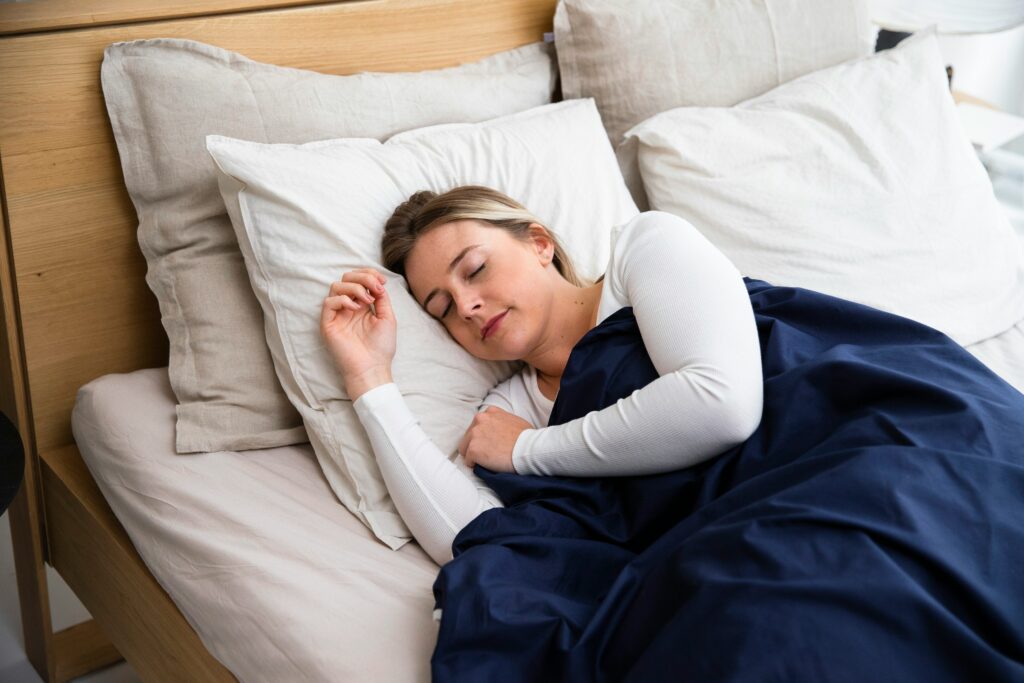Sleep is one of the fundamental pillars of our health, yet for many women, it can become a daily (or rather, nightly) challenge. Tossing and turning in bed, racing thoughts, and constant morning fatigue—if this sounds familiar, you’re not alone. Sleep disorders among women are common and can stem from hormonal fluctuations, mental stress, unbalanced lifestyle habits, and even environmental factors.
In this article, we’ll dive into the main causes of sleep disturbances in women, understand how the body and mind influence our sleep, and, most importantly, learn how to improve sleep quality using natural techniques, habit changes, and practical tips to help you enjoy peaceful and restful nights.
Why Do We Struggle to Fall Asleep? The Main Causes of Sleep Disorders in Women
Hormonal Changes That Disrupt Sleep
One of the most significant factors affecting sleep quality in women is hormones. The cyclical changes that occur in a woman’s body-whether due to the menstrual cycle, pregnancy, breastfeeding, or menopause-directly impact the nervous system and sleep processes.
During the menstrual cycle, for example, estrogen and progesterone levels fluctuate, which can be one reason why you experience difficulty falling asleep or restless sleep in the days leading up to or during your period. Menopause is also a well-known phase when many women suffer from insomnia due to a drop in estrogen levels, which can cause hot flashes, night sweats, and irregular sleep patterns.
Mental Stress and Anxiety—The Silent Sleep Killer
Busy lives, careers, family responsibilities, and never-ending to-do lists can push the body and mind into a state of chronic stress. When stress levels rise, the body releases more cortisol (the stress hormone), which affects heart rate, body temperature, and prevents the brain from entering a deep relaxation state.
Many women find themselves lying in bed at night, replaying the day’s tasks, worrying about unfinished business, or thinking about the future-all of which keep the brain active even when the body is exhausted. If you find yourself awake for hours with a flood of thoughts preventing you from resting, stress may be the root cause of your sleep disturbance.
Diet and Lifestyle Habits That Disrupt Sleep Cycles
What we eat and drink throughout the day directly affects our ability to fall asleep at night. Caffeine is one of the biggest sleep disruptors, and it’s not just found in coffee-tea, chocolate, soda, and even certain medications contain varying amounts of caffeine that can interfere with sleep.
Alcohol, which many women consume thinking it will help them fall asleep, can actually harm sleep quality. While it may induce relaxation in the short term, it leads to lighter, more fragmented sleep and increases the likelihood of waking up in the middle of the night.
Late-night eating, especially heavy meals before bed, can also cause sleep difficulties. The digestive system has to work harder when we eat close to bedtime, leading to discomfort and preventing deep rest.
Blue Light and Screens—The Invisible Barrier to Good Sleep
If you’re used to scrolling through social media before bed or watching TV in bed, this could be one of the reasons for your sleep issues. Screens emit blue light, which suppresses the production of melatonin—the body’s natural sleep hormone. When melatonin levels are low, the body struggles to transition into deep, high-quality sleep.
How to Improve Your Sleep Naturally and Effectively
Create a Relaxing Evening Routine
Our bodies love routine. If you train yourself to go to bed and wake up at the same times each day, your biological clock will adjust, making sleep more natural. Relaxation rituals before bed can help-taking a warm bath, drinking chamomile tea, reading a book (not on a screen!), or even practicing short meditation.
Improve Your Sleep Environment
Your bedroom should be a sanctuary of calm. Invest in a quality mattress, blackout curtains to block out light, a comfortable room temperature, and, of course, keep your phone away from the bed to avoid the temptation of endless scrolling.
Avoid Caffeine and Alcohol in the Evening
If you have trouble sleeping, try to avoid caffeine-containing foods and drinks for at least six hours before bedtime. If you’re looking for an afternoon coffee alternative, try herbal teas with calming effects like lavender, valerian root, or chamomile.
Incorporate Physical Activity During the Day
Exercise improves sleep quality, but timing matters. Intense workouts in the evening can actually stimulate the body and make it harder to fall asleep. On the other hand, a relaxed walk in the evening can promote calmness and naturally prepare you for sleep.
Breathing Techniques and Relaxation Exercises for Deeper Sleep
If you find yourself lying in bed unable to fall asleep, try deep breathing exercises. The “4-7-8” method is an excellent way to relax the body—inhale through your nose for 4 seconds, hold the breath for 7 seconds, and exhale slowly through your mouth for 8 seconds.
Invest in Yourself, It’s Time to Sleep Better!
Quality sleep is not a luxury-it’s a basic necessity that affects our physical, mental, and emotional well-being. If you’re struggling with sleep issues, try identifying the factors that may be affecting you and making small changes that can make a significant difference.
Creating a relaxing evening routine, avoiding sleep-disrupting factors, and incorporating sleep-supporting habits will allow you to enjoy uninterrupted nights of deep rest-and you’ll feel the difference the moment your mornings start with more energy, focus, and a positive mood.
You deserve to sleep well and wake up feeling amazing every single day!





